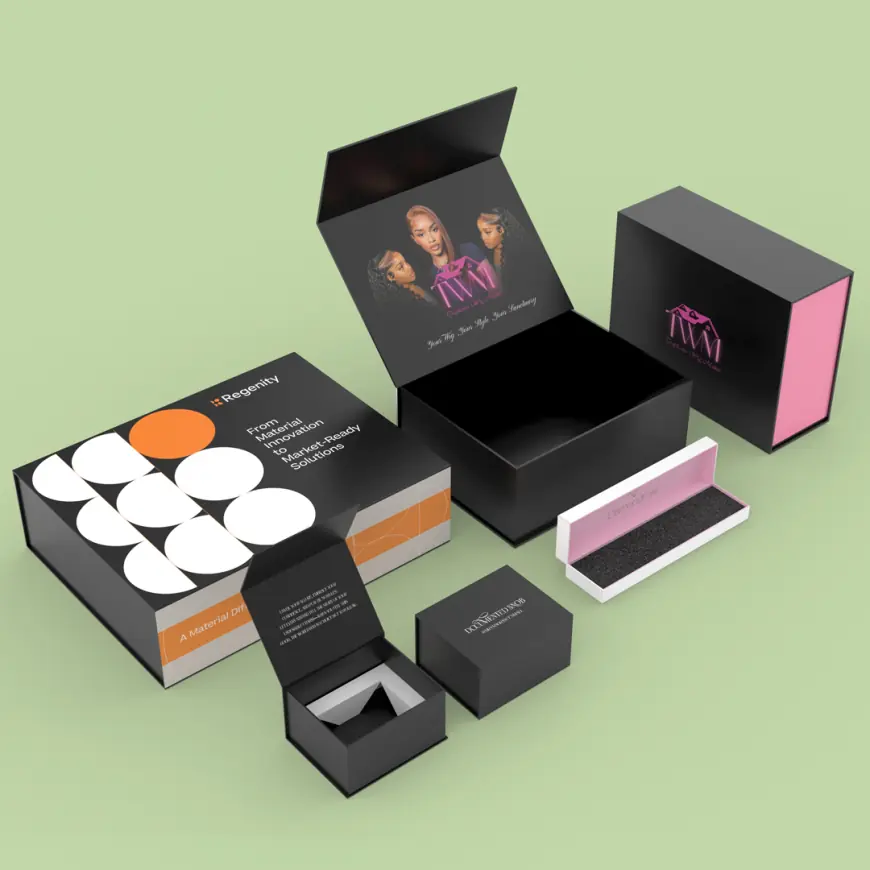Why Rigid Boxes packaging Are Investing in Eco-Friendly Packaging
Discover why rigid box brands are investing in eco-friendly packaging. Learn about benefits, materials, challenges, and the future of sustainable luxury boxes.

Packaging is no longer just about protection—it’s about presentation, branding, and sustainability. In today’s world, where climate change and environmental issues dominate global conversations, brands are shifting toward eco-friendly packaging solutions. Among all types of packaging, rigid boxes have become a popular choice for premium brands. But now, the trend is moving toward eco-friendly rigid boxes, blending luxury with sustainability.
Understanding Rigid Boxes
What Are Rigid Boxes?
Rigid boxes are sturdy packaging solutions made from thick paperboard, offering durability and a premium feel. Unlike folding cartons, these boxes don’t collapse, making them ideal for luxury products.
Industries Using Rigid Packaging
From luxury fashion and Custom jewelry boxes to electronics and cosmetics, rigid boxes dominate industries where presentation and product safety matter the most.
Why Brands Prefer Rigid Boxes
-
Premium appearance
-
Superior durability
-
Excellent for customization and branding
The Shift Toward Eco-Friendly Packaging
Growing Environmental Concerns
Plastic pollution and excessive waste are major global issues. Traditional packaging materials contribute significantly to landfills and ocean pollution, driving brands to rethink strategies.
Consumer Demand for Sustainable Choices
Modern shoppers care about sustainability. In fact, studies show that 70% of consumers are more likely to buy from brands committed to eco-friendly practices.
Regulations Pushing Eco-Friendly Packaging
Governments worldwide are implementing policies and bans on harmful packaging materials, pushing brands toward greener solutions.
Why Rigid Boxes Brands Are Investing in Eco-Friendly Packaging
Brand Reputation and Trust-Building
Eco-friendly packaging shows social responsibility, helping brands build trust and a positive reputation among customers.
Cost-Effectiveness in the Long Run
Although eco-friendly packaging may cost more upfront, it saves money in the long term by reducing waste, improving efficiency, and avoiding regulatory fines.
Meeting Consumer Expectations
Today’s buyers expect sustainable practices. Brands that don’t adapt risk losing relevance in a highly competitive market.
Environmental Benefits
Reducing Waste and Carbon Footprint
Eco-friendly rigid boxes use recyclable or biodegradable materials, cutting down overall waste.
Biodegradable and Recyclable Materials
Materials like Kraft paper and recycled cardboard make packaging fully recyclable and biodegradable.
Energy Savings in Production
Green packaging often requires less energy to produce, further reducing the carbon footprint.
Business Benefits
Competitive Market Advantage
In industries where packaging is part of the brand identity, eco-friendly packaging helps businesses stand out.
Long-Term Cost Efficiency
Investing in sustainable practices can reduce costs linked to waste management and supply chain inefficiencies.
Improved Brand Loyalty
Eco-conscious customers often become loyal advocates for sustainable brands.
Marketing Benefits
Positioning as a Sustainable Brand
Promoting eco-friendly packaging helps brands position themselves as socially responsible.
Attracting Eco-Conscious Customers
Millennials and Gen Z, in particular, prefer brands that care about the planet.
Enhancing Unboxing Experience
Eco-friendly packaging doesn’t just protect—it elevates the customer’s unboxing moment with both style and purpose.
Types of Eco-Friendly Rigid Packaging
Recyclable Paper Rigid Boxes
These are made from recycled materials and can be reused or recycled again after use.
Compostable Packaging
Packaging that breaks down naturally, reducing landfill waste.
Reusable Luxury Packaging
Rigid boxes designed for storage or secondary use add value while reducing waste.
Innovative Eco-Friendly Materials
Kraft Paper and Recycled Cardboard
Durable, recyclable, and stylish, making them a top choice for rigid packaging.
Plant-Based Plastics
Derived from renewable resources like corn starch, offering a greener alternative to petroleum plastics.
Soy-Based Inks and Water-Based Coatings
These provide high-quality printing while being safer for the environment.
Case Studies of Brands Adopting Eco-Friendly Rigid Packaging
Luxury Fashion Brands
High-end clothing brands use eco-friendly rigid boxes to align with sustainability goals.
Jewelry and Accessory Brands
Jewelry brands combine luxury and sustainability by switching to recyclable rigid boxes.
Electronics and Tech Companies
Tech companies now use eco-friendly rigid boxes to reduce their massive packaging waste footprint.
Challenges in Adopting Eco-Friendly Rigid Packaging
Higher Initial Costs
Eco-friendly materials may be pricier upfront compared to conventional ones.
Material Sourcing Limitations
Sourcing sustainable materials at scale can be challenging.
Balancing Durability with Sustainability
Maintaining luxury aesthetics while staying eco-friendly requires innovation and testing.
Future of Eco-Friendly Rigid Boxes
Emerging Technologies in Green Packaging
Nanotechnology, smart packaging, and new biodegradable composites are shaping the future.
Circular Economy in Packaging
Encouraging reuse, recycling, and repurposing of packaging.
Predictions for the Next Decade
Eco-friendly rigid boxes will become the default standard as brands move toward zero-waste goals.
Conclusion
Custom Rigid boxes are no longer just about luxury—they’re about responsibility. Brands investing in eco-friendly rigid packaging are future-proofing themselves, winning customer trust, and protecting the environment. This shift isn’t just a trend—it’s a necessity.
FAQs
1. What makes rigid boxes eco-friendly?
Eco-friendly rigid boxes use recyclable, biodegradable, or reusable materials that minimize environmental harm.
2. Are eco-friendly rigid boxes more expensive?
They can be slightly costlier upfront but save money in the long run by improving efficiency and brand loyalty.
3. Can luxury packaging still be sustainable?
Yes, luxury and sustainability can coexist through premium eco-materials and creative designs.
4. Why do consumers prefer eco-friendly packaging?
Because it aligns with their values of reducing waste and protecting the environment.
5. What’s the future of eco-friendly rigid packaging?
It’s heading toward smart, recyclable, and reusable designs that align with circular economy models.
What's Your Reaction?
 Like
0
Like
0
 Dislike
0
Dislike
0
 Love
0
Love
0
 Funny
0
Funny
0
 Angry
0
Angry
0
 Sad
0
Sad
0
 Wow
0
Wow
0


















































